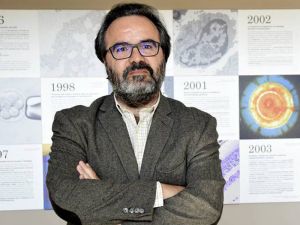Lluís Montoliu es doctor en Biología, investigador del CNB-CSIC y del Centro de Investigación Biomédica en Red en Enfermedades Raras, del Instituto de Salud Carlos III. Ha generado múltiples animales modificados genéticamente como modelos de enfermedades raras, como el albinismo. Ha sido pionero en el uso de las herramientas CRISPR de edición genética en España. En 2006 fundó la Sociedad Internacional de Tecnologías Transgénicas (ISTT), que presidió hasta 2014. Es presidente de la Sociedad Europea de Investigación en Células Pigmentarias (ESPCR), presidente de la Asociación para la investigación responsable e innovación en edición genética (ARRIGE) y miembro del Panel de Ética del Consejo Europeo de Investigación (ERC) en Bruselas. Es además divulgador y autor de los libros ¿Qué es el albinismo? (ALBA, 2018), Editando genes: recorta, pega y colorea (Next Door Publishers, 2019) y ¿Qué sabemos de…? El albinismo (Libros de la Catarata-CSIC, 2019).
“Asumo el cargo con el reto de mantener y expandir el gran trabajo realizado por todos mis antecesores, notablemente Miguel García Guerrero y Pere Puigdomènech, que han llevado al Comité de Ética del CSIC a ser lo que es hoy, una referencia nacional e internacional. La ética es cada vez más importante en investigación y es nuestra responsabilidad garantizar a la sociedad que todo lo que hacemos en ciencia se hace de acuerdo a la legislación vigente y a los códigos de buenas prácticas científicas”, señala Montoliu.
Carme Torras es doctora en Ciencias Computacionales e investigadora del IRI-CSIC-UPC. Ha aplicado modelos de inspiración biológica a la percepción, planificación, razonamiento, control de movimientos y, sobre todo, al aprendizaje automático implementado en robots. Lidera un grupo de investigación en Percepción y Manipulación Robotizada. Destaca su interés por las implicaciones sociales de la robótica y la inteligencia artificial. Es autora de novelas de ciencia-ficción, con las que busca promover el debate ético sobre las aplicaciones de las nuevas tecnologías.
El resto de miembros del nuevo comité son los investigadores Antonio Almagro, Carmen Ascaso, Carmen Ayuso, María José Camarasa, José Vicente García Ramos, Rodolfo Gutiérrez Palacios, José Javier Lucas, Ananda Pascual, Yolanda Sanz y Víctor Velasco.
El Comité de Ética es un órgano consultivo que asesora a la Presidencia y al Consejo Rector del CSIC. Su misión es velar por la integridad científica y la ética en la investigación. Además, está habilitado para la evaluación de proyectos de experimentación animal. Sus funciones son emitir informes y formular recomendaciones sobre los principios éticos y deontológicos relativos a la actividad investigadora.






